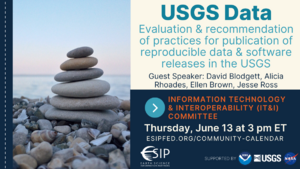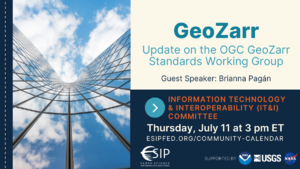Difference between revisions of "Interoperability and Technology"
| (11 intermediate revisions by the same user not shown) | |||
| Line 5: | Line 5: | ||
== Get Involved== | == Get Involved== | ||
| − | The [https://www.esipfed.org/get-involved/collaborate/iti IT&I committee] provides a venue for a monthly community webinar on current Information Technology and Interoperability topics | + | The [https://www.esipfed.org/get-involved/collaborate/iti IT&I committee] provides a venue for a monthly community webinar on current Information Technology and Interoperability topics. |
| − | ''' | + | '''IT&I Seminars''' are designed to get smart people to share insightful, provocative views of what's great and what's not about technology and interoperability in modern Earth science. |
* '''[http://lists.esipfed.org/mailman/listinfo/esip-interoperability Join the ESIP IT&I Email List]''' | * '''[http://lists.esipfed.org/mailman/listinfo/esip-interoperability Join the ESIP IT&I Email List]''' | ||
| Line 15: | Line 15: | ||
Upcoming meetings 3pm ET ([https://www.esipfed.org/get-involved/community-calendar calendar]) | Upcoming meetings 3pm ET ([https://www.esipfed.org/get-involved/community-calendar calendar]) | ||
| − | + | [[File:ITI_June_2024.png|thumb|IT&I June 2024]] | |
| + | |||
| + | June 13th: Evaluation and recommendation of practices for publication of reproducible data and software releases in the USGS - [https://www.usgs.gov/centers/community-for-data-integration-cdi/science/evaluation-and-recommendation-practices#overview Alicia Rhoades, Dave Blodgett, Ellen Brown, Jesse Ross.] | ||
| + | |||
| + | USGS Fundamental Science Practices recognize data and software as separate information product types. In practice, (e.g., in model application) data are rarely complete without workflow code and workflows are often treated as software that include data. This project assembled a cross mission area team to build an understanding of current practices and develop a recommended path. The project conducted 27 interviews with USGS employees with a wide range of staff roles from across the bureau. The project also analyzed existing data and software releases to establish an evidence base of current practices for implemented information products. The project team recommends that a workshop be held at the next Community for Data Integration face to face or other venue. The workshop should consider the sum total of the findings of this project and plan specific actions that the Community can take or recommendations that the Community can advocate to the Fundamental Science Practices Advisory Council or others. | ||
| + | |||
| + | [[File:ITI_July_2024.png|thumb|IT&I July 2024]] | ||
| + | |||
| + | July 11th: Update on OGC GeoZarr Standards Working Group - [https://www.briannapagan.com/ Dr. Brianna Rita Pagán] | ||
| + | |||
| + | Zarr is a cloud-native data format for n-dimensional arrays that enables access to data in compressed chunks of the original array. Zarr facilitates portability and interoperability on both object stores and hard disks. | ||
| + | |||
| + | As a generic data format, Zarr has increasingly become popular to use for geospatial purposes. As such, in June 2022, OGC endorsed Zarr V2.0 as an OGC Community Standard. The purpose of the GeoZarr SWG is to have an explicitly geospatial Zarr Standard (GeoZarr) adopted by OGC that establishes flexible and inclusive conventions for the Zarr cloud-native format that meet the diverse requirements of the geospatial domain. These conventions aim to provide a clear and standardized framework for organizing and describing data that ensures unambiguous representation. | ||
| − | |||
| − | |||
| − | |||
===== ESIP Vision ===== | ===== ESIP Vision ===== | ||
Latest revision as of 10:18, May 23, 2024
Get Involved
The IT&I committee provides a venue for a monthly community webinar on current Information Technology and Interoperability topics.
IT&I Seminars are designed to get smart people to share insightful, provocative views of what's great and what's not about technology and interoperability in modern Earth science.
- Join the ESIP IT&I Email List
- Find Future Meetings on the ESIP Calendar
- See Past Monthly IT&I Tech Dives Webinar Series
Upcoming meetings 3pm ET (calendar)
June 13th: Evaluation and recommendation of practices for publication of reproducible data and software releases in the USGS - Alicia Rhoades, Dave Blodgett, Ellen Brown, Jesse Ross.
USGS Fundamental Science Practices recognize data and software as separate information product types. In practice, (e.g., in model application) data are rarely complete without workflow code and workflows are often treated as software that include data. This project assembled a cross mission area team to build an understanding of current practices and develop a recommended path. The project conducted 27 interviews with USGS employees with a wide range of staff roles from across the bureau. The project also analyzed existing data and software releases to establish an evidence base of current practices for implemented information products. The project team recommends that a workshop be held at the next Community for Data Integration face to face or other venue. The workshop should consider the sum total of the findings of this project and plan specific actions that the Community can take or recommendations that the Community can advocate to the Fundamental Science Practices Advisory Council or others.
July 11th: Update on OGC GeoZarr Standards Working Group - Dr. Brianna Rita Pagán
Zarr is a cloud-native data format for n-dimensional arrays that enables access to data in compressed chunks of the original array. Zarr facilitates portability and interoperability on both object stores and hard disks.
As a generic data format, Zarr has increasingly become popular to use for geospatial purposes. As such, in June 2022, OGC endorsed Zarr V2.0 as an OGC Community Standard. The purpose of the GeoZarr SWG is to have an explicitly geospatial Zarr Standard (GeoZarr) adopted by OGC that establishes flexible and inclusive conventions for the Zarr cloud-native format that meet the diverse requirements of the geospatial domain. These conventions aim to provide a clear and standardized framework for organizing and describing data that ensures unambiguous representation.
ESIP Vision
To be a leader in promoting the collection, stewardship and use of Earth science data, information and knowledge that are responsive to societal needs.
Information Technology and Interoperability Committee
The Information Technology and Interoperability Committee of the ESIP Federation is a standing committee created to:
- ensure that data, information and services can be readily exchanged and integrated to improve Earth science data, information, products and services; and
- encourage the use of standards and protocols relevant to interoperability;
- encourage the use of best information technology practices to ensure the quality, usability and breadth of standards and protocols relevant to interoperability.
Archive
ISRSE 2009 Demonstration Information
More recent technical workshop information is integrated into the meeting content pages accessible from the home page.
Summer 2007 Technical Workshops
Summer 2006 Technical Workshops
Winter 2007 Technical Breakouts
Client Side Technology Infusion Working Group
2010 Rant and Raves Webinar Series and Telecon Information
Summer 2010 Technical Workshops
Solicitation for Outreach Package Development
Summer Meeting 2010, Knoxville, TN Meeting Notes
Winter Meeting 2011, Washington DC

